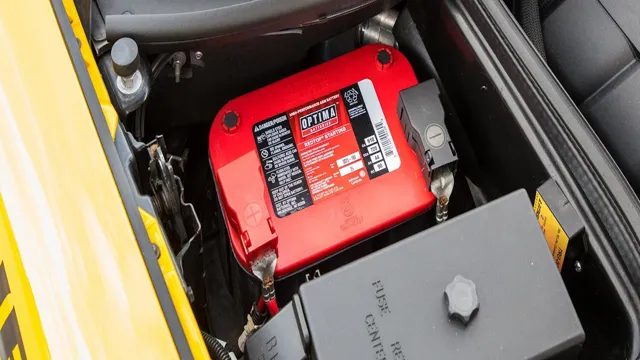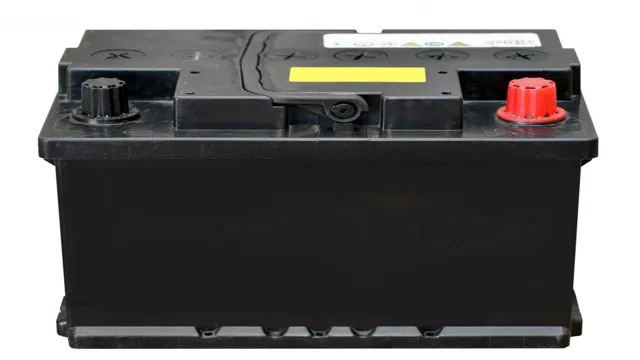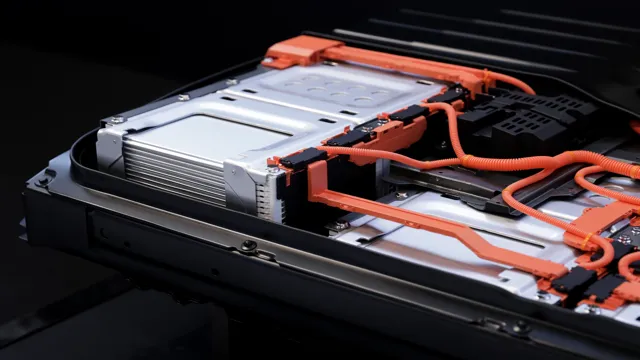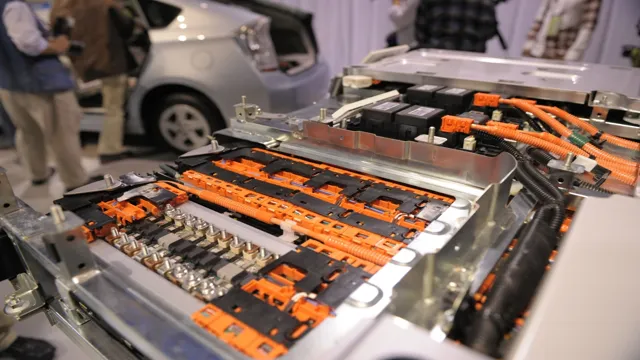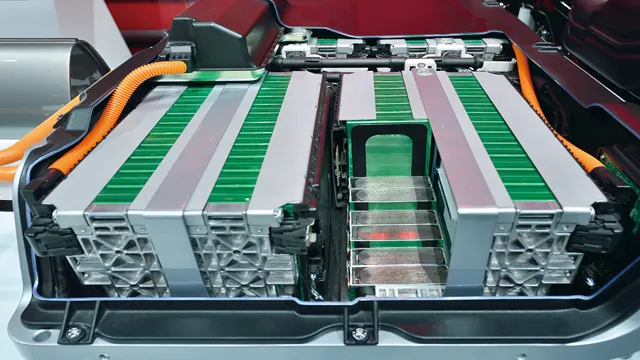Unpacking the Science Behind Electric Car Battery Technology: A Beginner’s Guide to Understanding the Basics
Electric car batteries are becoming increasingly popular and are rapidly changing the automotive industry. The way cars are powered is being revolutionized by electric cars, which run on power from batteries, making them environmentally friendly alternatives to gas-powered vehicles. In this blog, we’ll take a closer look at electric car batteries, their components, and how they function.
We’ll also explore the benefits of electric car batteries and how they are changing the way we think about cars. By the end of this blog, you’ll have a better understanding of electric car batteries, their functionality, and how they are changing the automotive landscape.
What are Electric Car Batteries?
Electric car battery basics encompass understanding the rechargeable battery used to power electric vehicles. These batteries are made up of thousands of individual battery cells, typically lithium-ion, and can range in size and capacity. They are responsible for storing the energy that powers the electric motor, and can be charged through an external charging port or regenerative braking.
The battery’s range or driving distance will depend on the size and capacity of the battery, as well as other factors such as driving habits and environmental conditions. As electric vehicles continue to grow in popularity, advancements in battery technology continue to improve, making electric cars a more practical and efficient mode of transportation.
Battery Composition
Electric car batteries are rechargeable batteries that power the electric motor in an electric vehicle. These batteries are different from a regular car battery and are designed to store energy for longer periods. They are usually made up of many cells, which consist of an anode, cathode, and an electrolyte.
The most common type of battery used in electric cars is a lithium-ion battery. These batteries are preferred due to their high energy density, low self-discharge rate, and ability to be recharged quickly. Some electric cars also use nickel-metal hydride batteries, which have a lower energy density but are more durable and have a longer lifespan.
The efficiency of an electric car battery depends on various factors such as the type of battery, the size of the battery, temperature, and driving style. All in all, the battery is a vital component of an electric car, and its composition plays a crucial role in determining the performance and range of the vehicle.
Battery Capacity
Electric car batteries are the heart of any electric vehicle. They store the power needed to operate the electric motor, making them a crucial component in the performance of the car. The capacity of an electric car battery, measured in kilowatt-hours (kWh), directly affects its range.
The higher the battery capacity, the more miles an electric car can travel on a single charge. Depending on the make and model, electric car batteries can have capacities ranging from 20kWh to over 100kWh. But it’s not just about the capacity of the battery, efficiency is also a key factor in maximizing range.
By using regenerative braking, electric motors can recover energy that would otherwise be lost during deceleration, extending the range of the battery. Additionally, more efficient battery management systems can help to optimize charging and discharge, improving overall battery performance and longevity. With advancements in battery technology, the range and capacity of electric car batteries are constantly improving, making them an increasingly viable and attractive alternative to traditional gas-powered vehicles.
Types of Electric Car Batteries
When it comes to electric car batteries, there are a few different types to consider. The most common type is lithium-ion, which is known for its high energy density and long cycle life. These batteries are also relatively lightweight and can charge quickly.
Another type of battery is the nickel-metal hydride battery, which is often found in hybrid cars. While not as energy-dense as lithium-ion, these batteries are more affordable and have a longer lifespan. Lead-acid batteries are also an option, though they are less commonly used due to their weight and limited range.
It’s important to note that different electric car models may use different types of batteries, so it’s important to research which type is best for your specific needs. Regardless of the type, proper battery maintenance and charging habits are crucial for maximizing the lifespan and efficiency of your electric car’s battery.
Lead-Acid Batteries
Lead-Acid Batteries Electric cars are becoming increasingly common on our roads due to their eco-friendly nature and cost efficiency, but their batteries can vary. One type of electric car battery is the lead-acid battery, an older technology that has been used for a long time in various applications, including vehicles. A lead-acid battery consists of lead electrodes submerged in an electrolyte solution of sulfuric acid and water.
The chemical reaction between the electrodes and the electrolyte generates electric energy, which is stored in the battery. Although lead-acid batteries are bulkier and heavier than other types of batteries, they are more affordable and have a longer lifespan. These batteries are also capable of providing high starting currents when necessary, making them a reliable choice for electric cars.
Furthermore, the maintenance and replacement of lead-acid batteries are relatively easy and cost-effective compared to other batteries. However, lead-acid batteries also have some cons, such as being less energy-dense and needing more frequent recharging than other types. Nevertheless, they remain a popular choice for electric car owners who want reliability and affordability without sacrificing performance.
Lithium-ion Batteries
Lithium-ion batteries are the most popular type of electric car battery, due to their high energy density and long lifespan. They are composed of a positive and negative electrode, separated by an electrolyte and contained in a metal or plastic casing. One common type of lithium-ion battery is the nickel-cobalt-aluminum (NCA) battery, which is used in Tesla vehicles.
Another popular type is the lithium-nickel-manganese-cobalt-oxide (NCM) battery, used in models from BMW and Chevrolet. Both of these batteries have their pros and cons, with NCA batteries having a higher energy density and NCM batteries having a longer lifespan. It’s important to consider these factors when choosing an electric car and its battery type, as well as understanding the environmental impact of battery production and disposal.
Nickel-Metal Hydride Batteries
Nickel-metal hydride batteries are a type of rechargeable battery that are commonly used in hybrid and electric vehicles. These batteries use a combination of a metallic hydride and nickel as the electrodes, which provide a high energy density and longevity. One of the main advantages of nickel-metal hydride batteries is that they are cheaper than many other types of electric car batteries, such as lithium-ion.
They also have a relatively low environmental impact and are easily recyclable. However, they do have some limitations, such as lower energy storage capacity and a shorter lifespan than other battery types. This means they may not be the best option for long-distance travel or high-performance electric vehicles.
Despite these limitations, nickel-metal hydride batteries remain a popular choice for many hybrid vehicles due to their cost-effectiveness and reliability.
Charging an Electric Car Battery
Electric car battery basics start with understanding how to charge the battery. One of the most important things to remember is to use a charging system that is compatible with your electric vehicle make and model. There are different types of charging systems available that vary in terms of charging speed and power output.
Level 1 charging stations use the standard 120-volt household outlet and can take up to 20 hours to fully charge an electric car battery. Level 2 charging systems can charge the battery much faster, usually in 4 to 8 hours. There are also Level 3 charging stations, also known as DC fast chargers, that can charge an electric car battery up to 80% in under 30 minutes.
It’s important to note that using a Level 3 charging system too often can degrade the battery’s performance over time. Ultimately, understanding how to properly charge your electric car battery can help prolong its lifespan and ensure that you’re able to get the most out of your electric vehicle.
Charging Methods
When it comes to charging an electric car battery, there are several methods to choose from, each with its own set of advantages and disadvantages. The three main methods are Level 1, Level 2, and DC fast charging. Level 1 charging uses a standard household outlet and can take up to 24 hours to fully charge the battery.
Level 2 charging requires a specialized charging port and can fully charge the battery in around 4-6 hours. DC fast charging is the quickest method and can charge the battery to 80% in less than 30 minutes. However, not all electric cars are compatible with DC fast charging.
When deciding which charging method to use, it’s essential to consider your specific vehicle’s battery size, your driving needs, and the availability of charging stations in your area. It’s also worth noting that regular charging can help maintain the battery’s health, and overcharging or letting the battery drain completely can lead to decreased battery life and potential damage. Overall, with a little planning and understanding of the various charging methods, charging an electric car battery can be a straightforward and hassle-free experience.
Charging Time
Charging an electric car battery is a crucial aspect of owning an electric car. The charging time of an electric car battery depends on several factors such as the charging method, battery capacity, and weather conditions. The most common charging method is Level 2 charging, which takes around 4-6 hours to fully charge the battery.
However, if you use a high-speed charger, the charging time can be reduced significantly. For instance, a DC fast charger can charge the battery up to 80% in just 30 minutes. The battery capacity also plays a significant role in charging time.
A bigger battery will take longer to charge compared to a smaller battery. In cold weather conditions, the battery takes longer to charge because the cold temperature affects the charging efficiency. Understanding the charging time of your electric car battery is crucial to avoid running out of charge while on the road.
Maintaining an Electric Car Battery
Electric car battery basics are essential to know if you own or plan to purchase an electric vehicle. Maintaining your battery is crucial for the longevity of your car and your wallet. One important factor to keep in mind is to avoid letting your battery reach extremely low or high temperatures.
This can cause permanent damage and lower the lifespan of your battery. It’s also important to keep your car battery charged regularly and not let it fully discharge. If you plan on leaving your car unused for an extended period, it’s recommended to keep it plugged in and charged.
Another key factor is to follow your car manufacturer’s instructions for maintenance and avoid using third-party charging stations. By following these basics, you can help maintain your electric car battery’s lifespan and avoid costly replacements.
Conclusion
In conclusion, electric car batteries are the powerhouse of the future, giving us a clean, efficient, and sustainable method of transportation. From lithium-ion to nickel-metal-hydride, these batteries come in different shapes and sizes, each with their own strengths and weaknesses. And just like the batteries themselves, we too must recharge and renew, taking care of our planet for generations to come.
So hop in, buckle up, and let’s ride into the exciting future of electric vehicles! As they say, the only thing more electrifying than the battery technology behind electric cars is the feeling of driving one. “
FAQs
What is an electric car battery?
An electric car battery is the power source for an electric car, storing electrical energy that is used to power the motor.
How long do electric car batteries last?
Electric car batteries can last anywhere from 5 to 15 years, depending on factors such as usage and maintenance.
How is an electric car battery charged?
An electric car battery is charged by plugging the car into an electrical outlet or charging station.
What is the difference between a lithium-ion battery and a lead-acid battery in electric cars?
Lithium-ion batteries are generally lighter and more efficient than lead-acid batteries, making them the preferred choice for modern electric cars.

